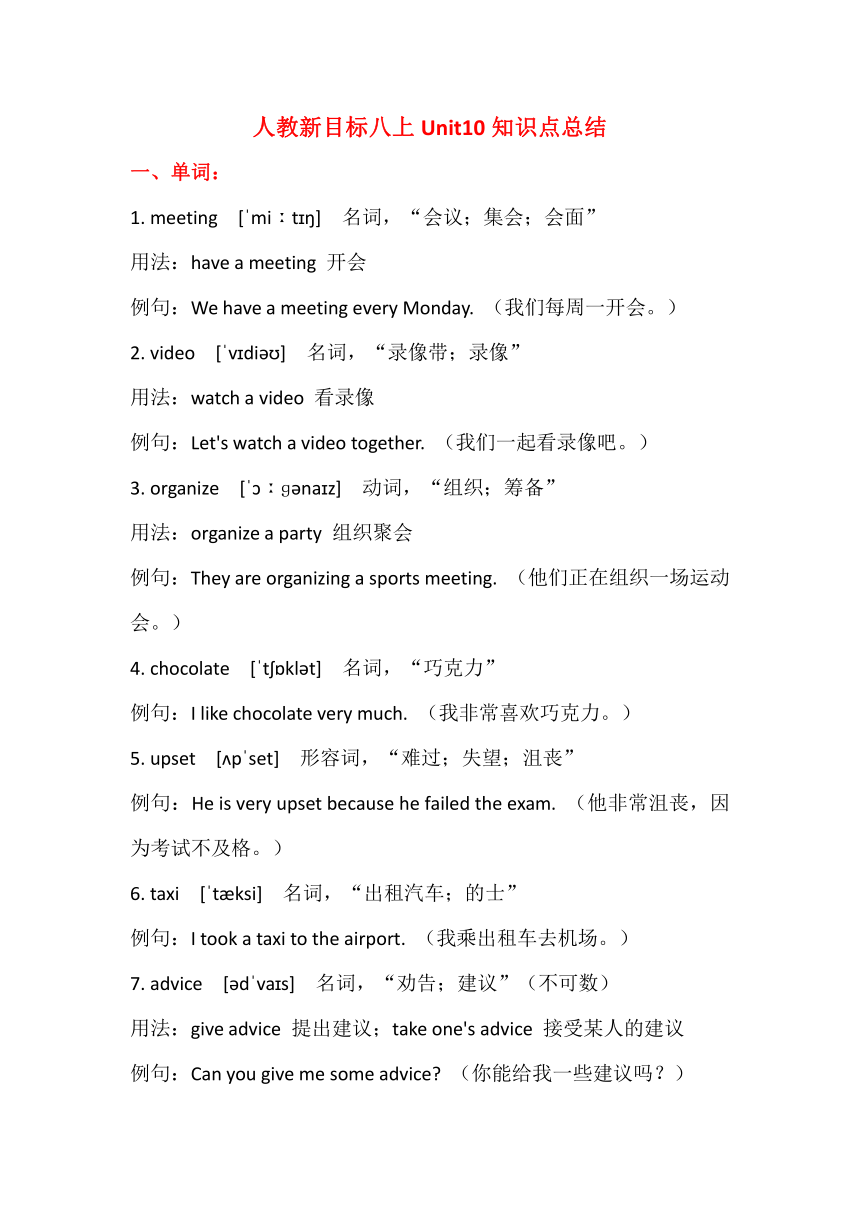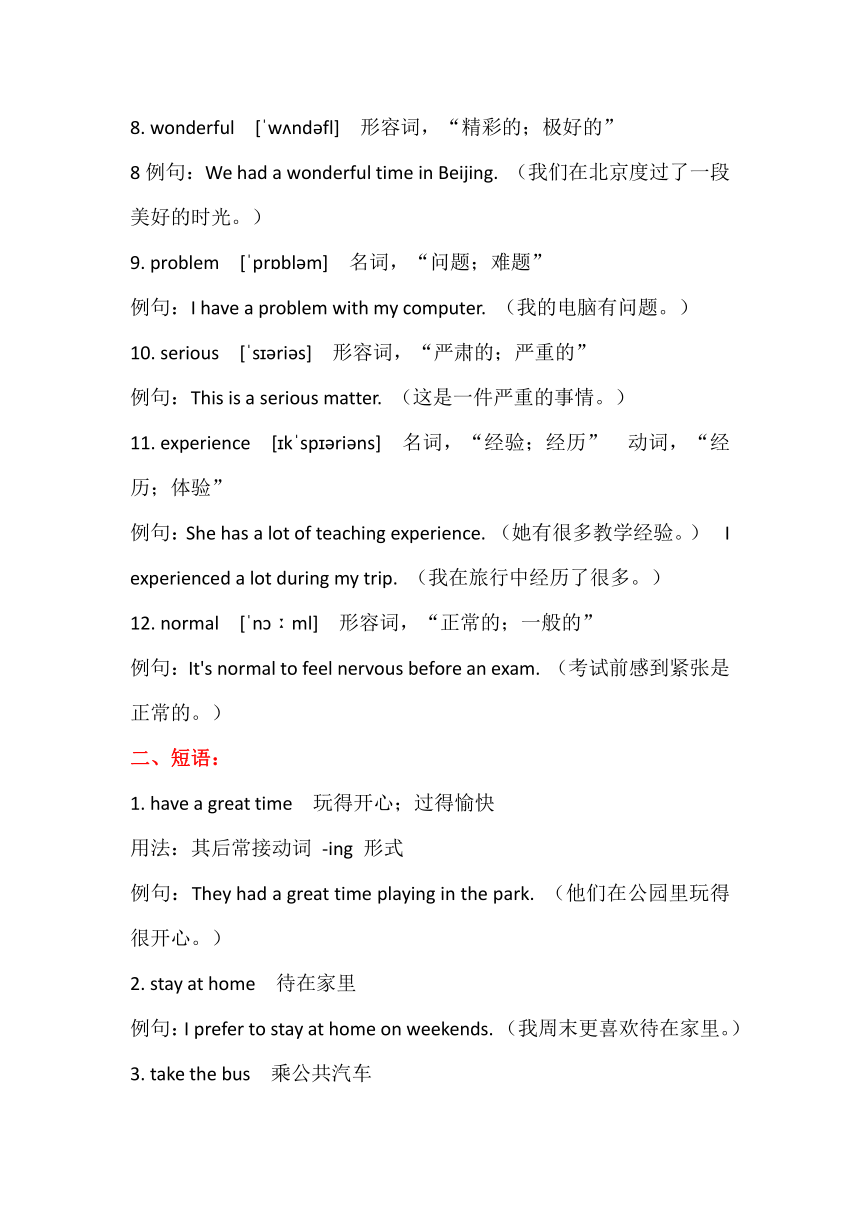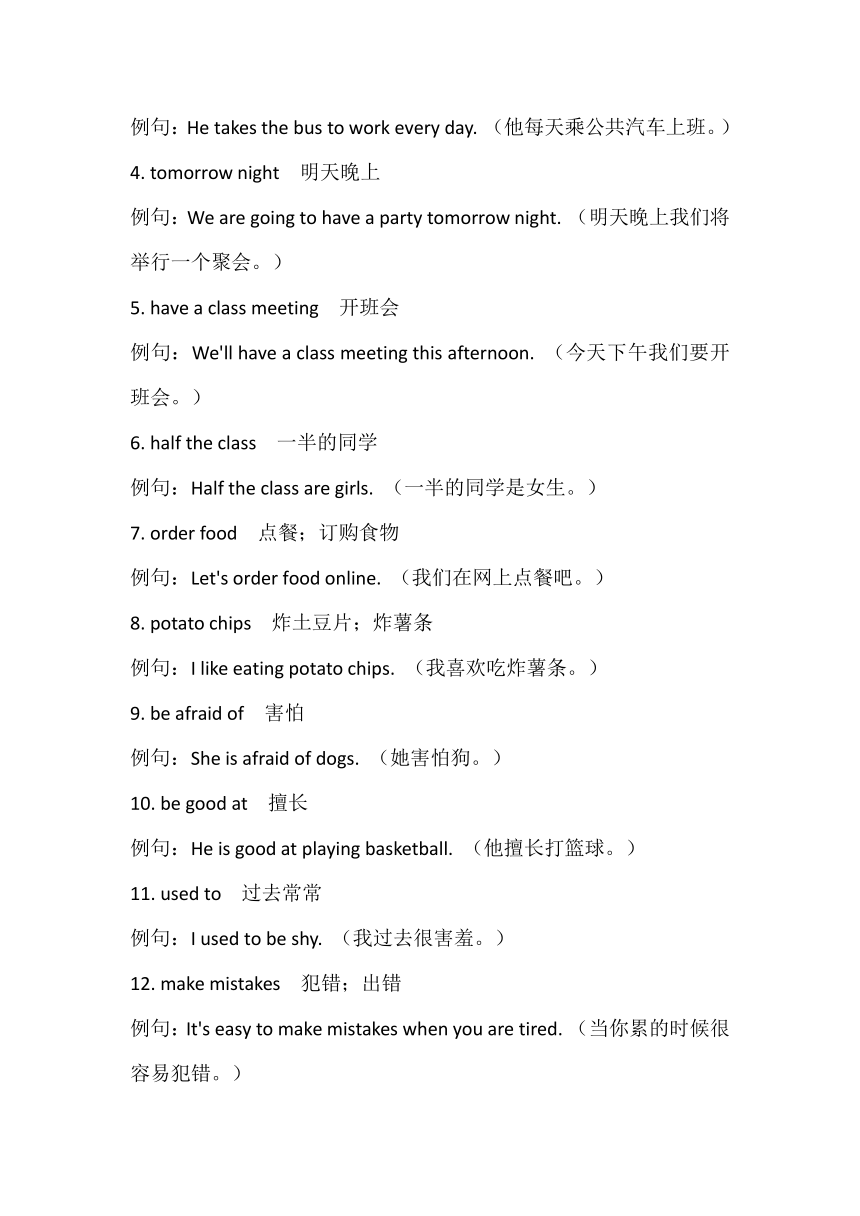Unit 10 If you go to the party, you'll have a great time!知识清单 2024-2025学年人教版八年级英语上册
文档属性
| 名称 | Unit 10 If you go to the party, you'll have a great time!知识清单 2024-2025学年人教版八年级英语上册 |

|
|
| 格式 | docx | ||
| 文件大小 | 19.8KB | ||
| 资源类型 | 教案 | ||
| 版本资源 | 人教新目标(Go for it)版 | ||
| 科目 | 英语 | ||
| 更新时间 | 2024-08-08 00:00:00 | ||
图片预览



文档简介
人教新目标八上Unit10知识点总结
一、单词:
1. meeting [ mi t ] 名词,“会议;集会;会面”
用法:have a meeting 开会
例句:We have a meeting every Monday. (我们每周一开会。)
2. video [ v di ] 名词,“录像带;录像”
用法:watch a video 看录像
例句:Let's watch a video together. (我们一起看录像吧。)
3. organize [ ɡ na z] 动词,“组织;筹备”
用法:organize a party 组织聚会
例句:They are organizing a sports meeting. (他们正在组织一场运动会。)
4. chocolate [ t kl t] 名词,“巧克力”
例句:I like chocolate very much. (我非常喜欢巧克力。)
5. upset [ p set] 形容词,“难过;失望;沮丧”
例句:He is very upset because he failed the exam. (他非常沮丧,因为考试不及格。)
6. taxi [ t ksi] 名词,“出租汽车;的士”
例句:I took a taxi to the airport. (我乘出租车去机场。)
7. advice [ d va s] 名词,“劝告;建议”(不可数)
用法:give advice 提出建议;take one's advice 接受某人的建议
例句:Can you give me some advice (你能给我一些建议吗?)
8. wonderful [ w nd fl] 形容词,“精彩的;极好的”
8例句:We had a wonderful time in Beijing. (我们在北京度过了一段美好的时光。)
9. problem [ pr bl m] 名词,“问题;难题”
例句:I have a problem with my computer. (我的电脑有问题。)
10. serious [ s ri s] 形容词,“严肃的;严重的”
例句:This is a serious matter. (这是一件严重的事情。)
11. experience [ k sp ri ns] 名词,“经验;经历” 动词,“经历;体验”
例句:She has a lot of teaching experience. (她有很多教学经验。) I experienced a lot during my trip. (我在旅行中经历了很多。)
12. normal [ n ml] 形容词,“正常的;一般的”
例句:It's normal to feel nervous before an exam. (考试前感到紧张是正常的。)
二、短语:
1. have a great time 玩得开心;过得愉快
用法:其后常接动词 -ing 形式
例句:They had a great time playing in the park. (他们在公园里玩得很开心。)
2. stay at home 待在家里
例句:I prefer to stay at home on weekends. (我周末更喜欢待在家里。)
3. take the bus 乘公共汽车
例句:He takes the bus to work every day. (他每天乘公共汽车上班。)
4. tomorrow night 明天晚上
例句:We are going to have a party tomorrow night. (明天晚上我们将举行一个聚会。)
5. have a class meeting 开班会
例句:We'll have a class meeting this afternoon. (今天下午我们要开班会。)
6. half the class 一半的同学
例句:Half the class are girls. (一半的同学是女生。)
7. order food 点餐;订购食物
例句:Let's order food online. (我们在网上点餐吧。)
8. potato chips 炸土豆片;炸薯条
例句:I like eating potato chips. (我喜欢吃炸薯条。)
9. be afraid of 害怕
例句:She is afraid of dogs. (她害怕狗。)
10. be good at 擅长
例句:He is good at playing basketball. (他擅长打篮球。)
11. used to 过去常常
例句:I used to be shy. (我过去很害羞。)
12. make mistakes 犯错;出错
例句:It's easy to make mistakes when you are tired. (当你累的时候很容易犯错。)
13. deal with 处理;应对
例句:I don't know how to deal with this problem. (我不知道如何处理这个问题。)
三、句型、语法汇总总结
(一)句型:
1. “If you go to the party, you'll have a great time!”
释义:这是一个条件状语从句,表示“如果......,就......”。
用法:if 引导的条件状语从句,如果主句用一般将来时,从句用一般现在时。
例句:If it rains tomorrow, I won't go hiking. (如果明天下雨,我就不去徒步旅行。)
2. “I think I'll take the bus to the party.”
释义:这是一个主从复合句,“I think”是主句,“I'll take the bus to the party”是宾语从句。
用法:在宾语从句中,当主句是一般现在时,从句可以根据需要用各种时态。
例句:I think he is a good student. (我认为他是个好学生。)
(二)语法:
1. 条件状语从句
释义:条件状语从句表示在某种条件下可能会发生的事情。
用法:
从句在前,主句在后时,中间不用逗号;主句在前,从句在后时,中间要用逗号隔开。
遵循“主将从现”原则,即主句用一般将来时,从句用一般现在时。
例句:If you study hard, you will pass the exam. (如果你努力学习,你就会通过考试。)
2. 一般将来时
释义:表示将来某个时间要发生的动作或存在的状态。
用法:
will + 动词原形
be going to + 动词原形
例句:I will visit my grandparents next week. (下周我将去看望我的祖父母。) He is going to play football tomorrow. (他明天打算踢足球。)
四、时态(后面有拓展部分,可选用)
一般将来时
1. “be going to + 动词原形” 表示打算、计划、准备做某事
例句:I'm going to learn to play the piano next year. (明年我打算学弹钢琴。)
例句:They are going to have a picnic this weekend. (这个周末他们打算去野餐。)
2. “shall + 动词原形” 用于第一人称(I/we),表示将来的动作或意愿,在现代英语中较少使用,常被“will”替代
例句:I shall go shopping tomorrow. (明天我要去购物。)
3. “be + 动词 -ing 形式” 表示按计划或安排即将发生的动作
例句:The train is leaving in five minutes. (火车五分钟后出发。)
例句:She is coming tomorrow. (她明天来。)
4. “be about to + 动词原形” 表示即将、马上要做某事,通常不与具体的时间状语连用
例句:I was about to leave when the phone rang. (我正要离开,这时电话响了。)
一般现在时
表示经常发生的动作或存在的状态
例句:He always goes to school by bike. (他总是骑自行车上学。)
现在进行时
表示正在进行的动作
例句:They are having a party now. (他们现在正在举办聚会。)
一般过去时
表示过去发生的动作或存在的状态
例句:I went to the party yesterday. (我昨天去参加聚会了。)
五、优美例句欣赏
1. If you follow your heart and chase your dreams at the party, you'll discover a world full of possibilities and joy. (如果你在聚会上跟随自己的内心,追逐自己的梦想,你将会发现一个充满可能性和欢乐的世界。)
2. If you dance with abandon under the starlit sky of the party, you'll feel like a free spirit soaring through the night. (如果你在聚会的星空下尽情舞蹈,你会感觉自己像一个在夜空中翱翔的自由灵魂。)
3. If you share your stories and laughter with friends at the party, you'll create memories that will warm your heart for a lifetime. (如果你在聚会上和朋友们分享你的故事和欢笑,你将创造出能温暖你一生的回忆。)
4. If you look into the eyes of others at the party, you'll find kindness and connection that will make the world seem a little smaller and a lot more beautiful. (如果你在聚会上看着别人的眼睛,你会发现友善和联系,这会让世界看起来更小也更美丽。)
5. If you embrace the moment and let go of your worries at the party, you'll experience a sense of freedom and happiness that is truly magical. (如果你在聚会上拥抱当下,放下忧虑,你将体验到一种真正神奇的自由和幸福的感觉。)
一、单词:
1. meeting [ mi t ] 名词,“会议;集会;会面”
用法:have a meeting 开会
例句:We have a meeting every Monday. (我们每周一开会。)
2. video [ v di ] 名词,“录像带;录像”
用法:watch a video 看录像
例句:Let's watch a video together. (我们一起看录像吧。)
3. organize [ ɡ na z] 动词,“组织;筹备”
用法:organize a party 组织聚会
例句:They are organizing a sports meeting. (他们正在组织一场运动会。)
4. chocolate [ t kl t] 名词,“巧克力”
例句:I like chocolate very much. (我非常喜欢巧克力。)
5. upset [ p set] 形容词,“难过;失望;沮丧”
例句:He is very upset because he failed the exam. (他非常沮丧,因为考试不及格。)
6. taxi [ t ksi] 名词,“出租汽车;的士”
例句:I took a taxi to the airport. (我乘出租车去机场。)
7. advice [ d va s] 名词,“劝告;建议”(不可数)
用法:give advice 提出建议;take one's advice 接受某人的建议
例句:Can you give me some advice (你能给我一些建议吗?)
8. wonderful [ w nd fl] 形容词,“精彩的;极好的”
8例句:We had a wonderful time in Beijing. (我们在北京度过了一段美好的时光。)
9. problem [ pr bl m] 名词,“问题;难题”
例句:I have a problem with my computer. (我的电脑有问题。)
10. serious [ s ri s] 形容词,“严肃的;严重的”
例句:This is a serious matter. (这是一件严重的事情。)
11. experience [ k sp ri ns] 名词,“经验;经历” 动词,“经历;体验”
例句:She has a lot of teaching experience. (她有很多教学经验。) I experienced a lot during my trip. (我在旅行中经历了很多。)
12. normal [ n ml] 形容词,“正常的;一般的”
例句:It's normal to feel nervous before an exam. (考试前感到紧张是正常的。)
二、短语:
1. have a great time 玩得开心;过得愉快
用法:其后常接动词 -ing 形式
例句:They had a great time playing in the park. (他们在公园里玩得很开心。)
2. stay at home 待在家里
例句:I prefer to stay at home on weekends. (我周末更喜欢待在家里。)
3. take the bus 乘公共汽车
例句:He takes the bus to work every day. (他每天乘公共汽车上班。)
4. tomorrow night 明天晚上
例句:We are going to have a party tomorrow night. (明天晚上我们将举行一个聚会。)
5. have a class meeting 开班会
例句:We'll have a class meeting this afternoon. (今天下午我们要开班会。)
6. half the class 一半的同学
例句:Half the class are girls. (一半的同学是女生。)
7. order food 点餐;订购食物
例句:Let's order food online. (我们在网上点餐吧。)
8. potato chips 炸土豆片;炸薯条
例句:I like eating potato chips. (我喜欢吃炸薯条。)
9. be afraid of 害怕
例句:She is afraid of dogs. (她害怕狗。)
10. be good at 擅长
例句:He is good at playing basketball. (他擅长打篮球。)
11. used to 过去常常
例句:I used to be shy. (我过去很害羞。)
12. make mistakes 犯错;出错
例句:It's easy to make mistakes when you are tired. (当你累的时候很容易犯错。)
13. deal with 处理;应对
例句:I don't know how to deal with this problem. (我不知道如何处理这个问题。)
三、句型、语法汇总总结
(一)句型:
1. “If you go to the party, you'll have a great time!”
释义:这是一个条件状语从句,表示“如果......,就......”。
用法:if 引导的条件状语从句,如果主句用一般将来时,从句用一般现在时。
例句:If it rains tomorrow, I won't go hiking. (如果明天下雨,我就不去徒步旅行。)
2. “I think I'll take the bus to the party.”
释义:这是一个主从复合句,“I think”是主句,“I'll take the bus to the party”是宾语从句。
用法:在宾语从句中,当主句是一般现在时,从句可以根据需要用各种时态。
例句:I think he is a good student. (我认为他是个好学生。)
(二)语法:
1. 条件状语从句
释义:条件状语从句表示在某种条件下可能会发生的事情。
用法:
从句在前,主句在后时,中间不用逗号;主句在前,从句在后时,中间要用逗号隔开。
遵循“主将从现”原则,即主句用一般将来时,从句用一般现在时。
例句:If you study hard, you will pass the exam. (如果你努力学习,你就会通过考试。)
2. 一般将来时
释义:表示将来某个时间要发生的动作或存在的状态。
用法:
will + 动词原形
be going to + 动词原形
例句:I will visit my grandparents next week. (下周我将去看望我的祖父母。) He is going to play football tomorrow. (他明天打算踢足球。)
四、时态(后面有拓展部分,可选用)
一般将来时
1. “be going to + 动词原形” 表示打算、计划、准备做某事
例句:I'm going to learn to play the piano next year. (明年我打算学弹钢琴。)
例句:They are going to have a picnic this weekend. (这个周末他们打算去野餐。)
2. “shall + 动词原形” 用于第一人称(I/we),表示将来的动作或意愿,在现代英语中较少使用,常被“will”替代
例句:I shall go shopping tomorrow. (明天我要去购物。)
3. “be + 动词 -ing 形式” 表示按计划或安排即将发生的动作
例句:The train is leaving in five minutes. (火车五分钟后出发。)
例句:She is coming tomorrow. (她明天来。)
4. “be about to + 动词原形” 表示即将、马上要做某事,通常不与具体的时间状语连用
例句:I was about to leave when the phone rang. (我正要离开,这时电话响了。)
一般现在时
表示经常发生的动作或存在的状态
例句:He always goes to school by bike. (他总是骑自行车上学。)
现在进行时
表示正在进行的动作
例句:They are having a party now. (他们现在正在举办聚会。)
一般过去时
表示过去发生的动作或存在的状态
例句:I went to the party yesterday. (我昨天去参加聚会了。)
五、优美例句欣赏
1. If you follow your heart and chase your dreams at the party, you'll discover a world full of possibilities and joy. (如果你在聚会上跟随自己的内心,追逐自己的梦想,你将会发现一个充满可能性和欢乐的世界。)
2. If you dance with abandon under the starlit sky of the party, you'll feel like a free spirit soaring through the night. (如果你在聚会的星空下尽情舞蹈,你会感觉自己像一个在夜空中翱翔的自由灵魂。)
3. If you share your stories and laughter with friends at the party, you'll create memories that will warm your heart for a lifetime. (如果你在聚会上和朋友们分享你的故事和欢笑,你将创造出能温暖你一生的回忆。)
4. If you look into the eyes of others at the party, you'll find kindness and connection that will make the world seem a little smaller and a lot more beautiful. (如果你在聚会上看着别人的眼睛,你会发现友善和联系,这会让世界看起来更小也更美丽。)
5. If you embrace the moment and let go of your worries at the party, you'll experience a sense of freedom and happiness that is truly magical. (如果你在聚会上拥抱当下,放下忧虑,你将体验到一种真正神奇的自由和幸福的感觉。)
同课章节目录
- Unit 1 Where did you go on vacation?
- Section A
- Section B
- Unit 2 How often do you exercise?
- Section A
- Section B
- Unit 3 I'm more outgoing than my sister.
- Section A
- Section B
- Unit 4 What's the best movie theater?
- Section A
- Section B
- Unit 5 Do you want to watch a game show?
- Section A
- Section B
- Unit 6 I'm going to study computer science.
- Section A
- Section B
- Unit 7 Will people have robots?
- Section A
- Section B
- Unit 8 How do you make a banana milk shake?
- Section A
- Section B
- Unit 9 Can you come to my party?
- Section A
- Section B
- Unit 10 If you go to the party, you'll have a grea
- Section A
- Section B
